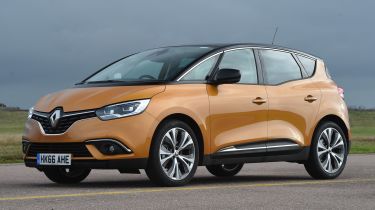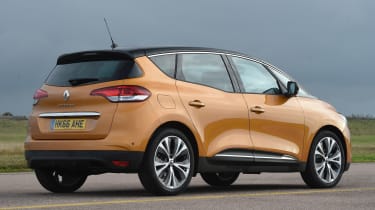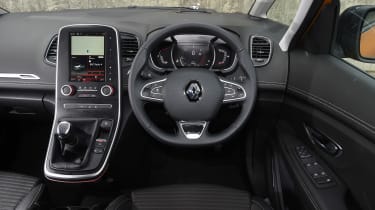Used Renault Scenic (Mk4, 2016-2019) review
A full used buyer’s guide on the Renault Scenic covering the Scenic Mk4 (2016-2019)
Verdict
New Renault Scenics are no longer available in the UK, and the fact that there’s no significant appetite for it is a shame, because it’s good to drive, bursting with practicality and excellent value. It seems SUV-focused buyers no longer want MPVs of any size. As a result, second-hand Scenics are much more unusual than you might think, and that’s unfortunate. This Mk4 model looks really smart and it offers a level of cabin versatility that’s generally not available in the compact SUV sector – especially if you want seven-seat accommodation. We liked the Grand Scenic enough to commend it in our 2017 Best MPV category in our New Car Awards, and it’s still worthy of your consideration.
Manufacturers generally play safe with their cars because getting it wrong can prove disastrous – but not all companies are the same. Renault stands out when it comes to taking risks and innovating, and while some of its business decisions have been questionable over the years (such as the Avantime and Vel Satis), this French firm has also created some all-time greats.
These include the 1960s R4 and R16, while in the 1990s it came up with the Scenic, a brilliant, Mégane-based MPV. Rivals latched on, and soon there were numerous small MPVs on the market – but changing tastes mean virtually all have now disappeared, including the Scenic and its bigger, seven-seat brother, the Grand Scenic.
Used - available now

2022 Ford
Focus
18,350 milesManualPetrol1.0L
Cash £17,076
2025 Audi
Q2
12,099 milesAutomaticPetrol1.5L
Cash £24,490
2020 Ford
Focus
46,802 milesManualPetrol1.5L
Cash £14,296
2022 Ford
Mustang
35,168 milesAutomaticPetrol5.0L
Cash £32,198Model covered
- Renault Scenic Mk4 (2016-2019) - MPVs have fallen out of fashion, but French model won’t go out of style.
History
The Scenic Mk4 arrived in December 2016. Priced from £21,445, it kicked off with a 1.3-litre TCe engine available in 114bhp and 128bhp forms. There was also a 1.5 dCi diesel model producing 128bhp, 109bhp or 158bhp; the latter two versions were available with an EDC (Efficient Dual Clutch) automatic transmission.
February 2018 saw the introduction of a new turbocharged petrol unit with direct injection, which promised more power and improved economy. Displacing 1.3 litres and known as the Energy TCe, it came in both 114bhp and 138bhp form. The latter, badged TCe 140, was available with manual or EDC automatic transmissions.
From November 2018 the line-up was revised to consist of Play, Iconic and Signature trims, but within a year the Scenic had been dropped from Renault’s UK range. The Grand Scenic was axed in spring 2020.
Which one should you buy?
We wouldn’t steer you away from any of the powertrains. All of them give reasonable performance and refinement, and as you’d expect, the diesels offer significantly better economy, too. The EDC transmission is smooth and easy to live with as well.
The entry-level Expression+ comes with dual-zone climate control, automatic headlights and wipers, powered windows front and rear, electrically adjustable and heated door mirrors, plus a seven-inch touchscreen with DAB and Bluetooth.
Dynamique Nav adds front and rear parking sensors and navigation, while the Dynamique S Nav gets a rear camera, head-up display, privacy glass, 8.7-inch screen, panoramic roof, Bose 11-speaker hi-fi, ambient cabin lighting and integral sun blinds for the side windows. The Signature Nav has LED headlights, electrically adjustable front seats and leather trim.
Alternatives to the Renault Scenic
Arguably, many rivals are mid-sized SUVs, but we’ll stick with compact MPVs here. That opens up a few great options including the Kia Carens, which is reliable, top value and well equipped. The Ford S-Max is stylish, great to drive and relatively plentiful, while the Volkswagen Touran is solidly constructed, easy to live with and available with a range of excellent engines.
One of the more popular seven-seaters was the Vauxhall Zafira, which is good value and very versatile, while the Citroen Grand C4 Picasso (which came in five-seat form as the C4 Picasso) is another stylish and good-value option. A more left-field option is the Mazda 5, while BMW’s 2 Series Gran Tourer is worth a look – but more costly.
What to look for
Wheels
All Scenics feature 20-inch alloys, which can make the ride a bit fidgety on rough roads. Replacement tyres are £100 a corner.
Diesels
All diesel Scenics and Grand Scenic Mk4s are Euro 6 compliant, so you should be able to drive in Clean Air Zones without fees.
Towing
Regardless of the powertrain, all pre-spring 2019 Scenic and Grand Scenics are able to pull up to 1,850kg. This was then cut to 1,800kg.
Warranty
All Scenics come with four-year/100k-mile cover; the first two years have no mileage limit. There’s three years’ paint cover and 12 for corrosion.
Common faults
Some owners mention issues with ECUs and sensors, while keyless-locking systems can play up, as can Bluetooth connections. All Scenics get large 20-inch wheels, so keep an eye out for kerb damage, and listen for any dashboard rattles.
Interior
Moving up the range makes a big difference to the quality of the materials and the cabin ambience. Yet whatever you buy you’ll get plenty of space for five adults, while the third row of seats in the Grand Espace is fine for children, or small adults on short journeys. The fit and finish is good, while boot space is impressive. The Scenic and Grand Scenic also features a sliding middle row, so boot space is extremely variable – and class competitive.
The Scenic was fitted with a seven-inch portrait-style infotainment touchscreen as standard, while an 8.7-inch unit was available on higher-specification models.
Prices
You can view prices for a Renault Scenic from our Find a Car service or view prices of a specific model with our free car valuation tool.
Running costs
All Scenics and Grand Scenics need to be serviced every 12 months or 16,000 miles, whichever comes first. Services alternate between minor and major, which are priced at £129 and £179 respectively, regardless of engine. Whereas the minor service is just an oil and filter change, the major adds new air and pollen filters. The brake fluid also needs to be replaced every three years or 80,000 miles (at £69), while fresh coolant is required every five years or 96,000 miles (at £139).
Diesels need new cambelts every six years or 96,000 miles (at £499); petrols are chain driven. Service plans include two (one minor, one major) for £265, or four (two minor, two major) for £520.
Recalls
Renault has recalled the Scenic Mk4 three times so far. The first time was in September 2017, when 610 cars (including some Méganes and Kadjar SUVs) made between September and November 2016 were recalled because of faulty curtain airbags. In the event of a collision, these could potentially fail to deploy.
In November 2019, Renault recalled 116 Scenics built between September 2018 and June 2019. This time it was because the NOx (nitrogen oxide) sensor hadn’t been tightened up properly on the production line, so it could sometimes work loose; it simply needed to be tightened up for the issue to be resolved. The most recent campaign came in June 2020, when 197 Méganes and Scenics were recalled because the fuel hose could chafe, leading to leaks. The fix was a straightforward hose replacement.
Driver Power owner satisfaction
This Scenic’s lack of sales success in the UK is betrayed by the fact that the fourth-generation model has never appeared in any of our new or used Driver Power surveys. When these MPVs were current, Renault was generally getting mid-table scores at best, and came 20th out of 29 firms in our 2021 Brands survey. Owners liked the ride quality and handling, but had less positive things to say about the drivetrains.









